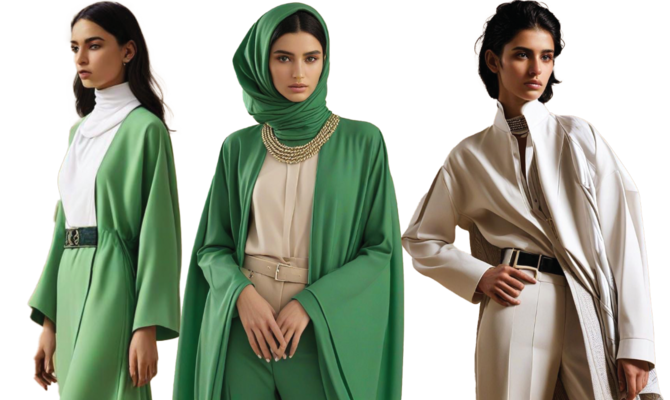RIYADH: Saudi Arabia has witnessed a remarkable transformation in its fashion industry in recent years, emerging as a vibrant and dynamic regional hub of creativity. Now, thanks to the power of artificial intelligence, more opportunities are fast emerging.
With a blend of traditional influences and modern innovation, Saudi designers have been captivating global audiences, redefining cultural norms, and showcasing the Kingdom’s rich heritage through contemporary fashion.
The establishment of the Fashion Commission in 2020 has led to the launch of showstopper events such as Riyadh Fashion Week. One particularly innovative event that took place alongside October’s fashion week was the Tasawar exhibition.
Created by social media platform Snapchat, Tasawar — or “to imagine” in Arabic — welcomed visitors to explore a virtual reality gallery showcasing the creations of five Saudi designers and allowed guests to virtually try on clothing.

Abdullah Al-Hammadi, the managing director of Snapchat in Saudi Arabia, said that the exhibition was the first of its kind in the Middle East combining technology with the world of fashion.
“In the Tasawar exhibition, visitors can visit five rooms of Saudi designers where they will learn about their stories and the use of different augmented reality technologies in each room,” Al-Hammadi told Arab News.
By adjusting the filter in a room, the theme could be altered to help immerse visitors in the worlds of the various designers and their sources of inspiration.
Among the five designers who took part in the exhibit was Mohammed Khoja, owner of the fashion brand Hindamme, who praised the exhibit’s inventive use of AI. “Tasawar by Snapchat is the best example of how AI can be used in fashion effectively,” Khoja told Arab News.
“We created a universe for Hindamme and immersed users both in the digital as well as physical space. We created a mirror where users could try on digital pieces from Hindamme as well as special filters and lenses that take users on experiential journeys.”
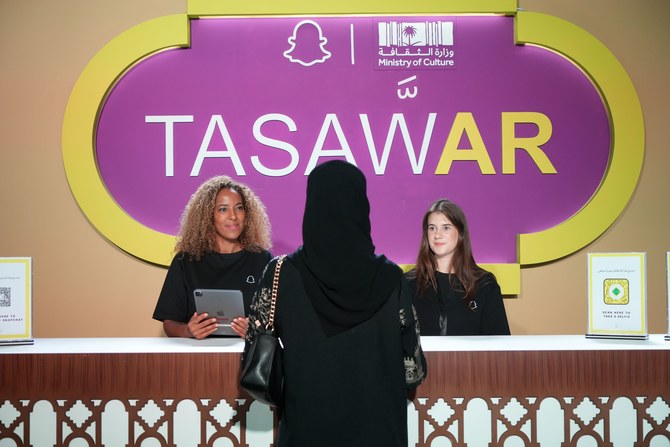
File photo showing participants in the Tawasar xhibition held in October 2-23 at the King Abdullah Financial District, as part of Riyadh Fashion Week. (Supplied)
However, as with other creative industries, there are anxieties about how just involved AI ought to be in the design process and what its encroachment could mean for fashion brands and culture more generally.
Although Khoja believes AI can be a valuable tool for research, he says that it should not be used as a primary design tool, as it may “handicap the designer’s own authentic identity and creativity.”
“AI is primarily a search tool that predicts what you want to see,” he said. “So when you search different themes, you get a mashup of what AI creates for you.
“Suggestions from AI are interesting, but they don’t come from your emotions. That is why I think AI will never truly replace our natural creativity as designers.
“AI is great, however, when used as a tool to perform routine functions and can save us a lot of time and energy in that respect.”
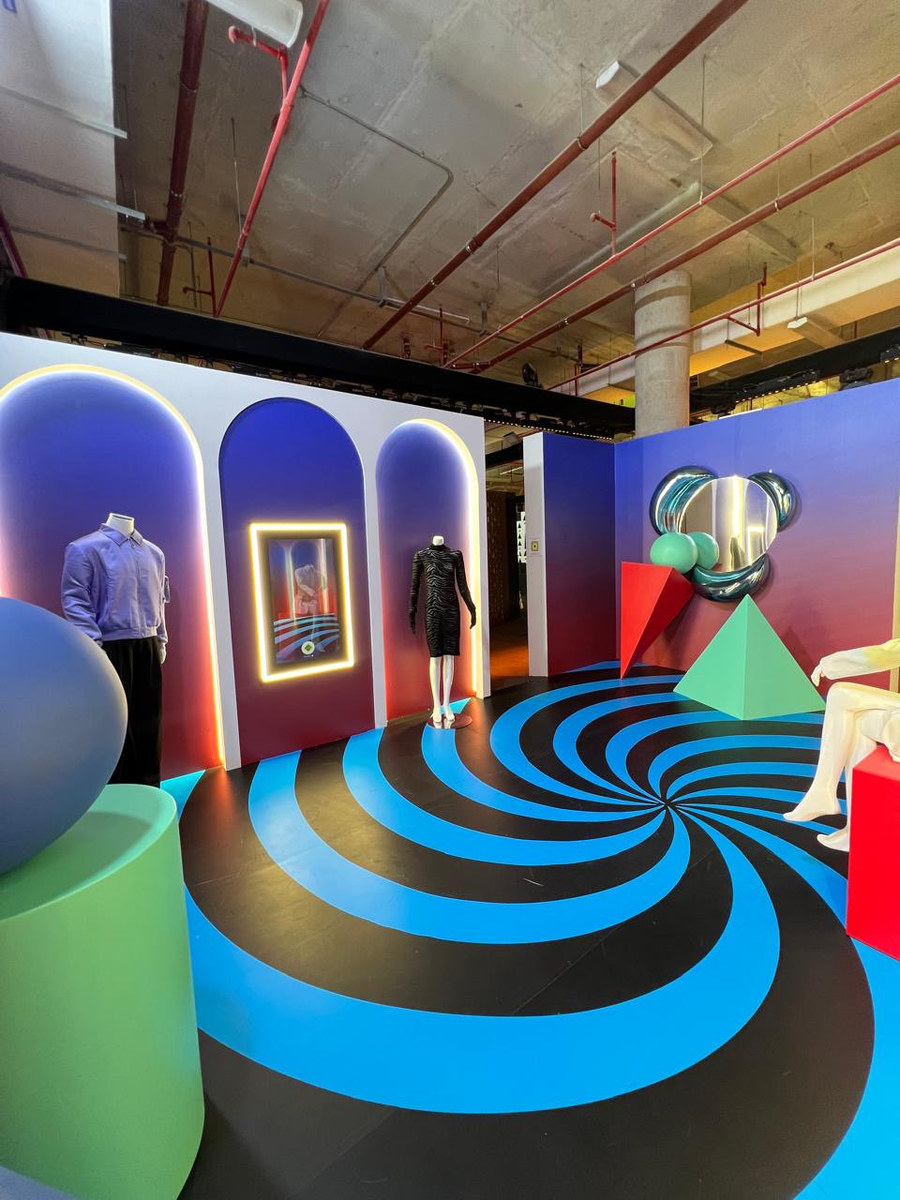
Riyadh Fashion Week collaborated with Snapchat to showcase the creations of five Saudi Arabian designers at the Tasawar exhibition, which uses augmented reality and AI to bridge the physical and digital realms. (AN photo by Rahaf Jambi)
Dalia Darweesh, a personal stylist and editor of List Magazine, also views AI as a useful tool for creating mood boards and looks for clients based on their body shape, saving a significant amount of time.
“When it comes to fashion brands, AI can help analyze trends and customers preferences for future products,” she told Arab News. “In some cases, fashion brands can offer virtual fittings, making online shopping a seamless experience.”
She added: “One of my favorite businesses that utilizes AI is Taffi Inc., an online platform offering personalized styling services through an AI assistant in addition to professional stylists as well.
“I dislike the idea of AI taking over the world, especially within the creative industry. Yet, if it helps in assisting and delegating tasks, then it is essential to use.”
Fashion journalist Mohammed Yousif is likewise cautious about the applications of AI in the industry. “AI can significantly help reduce the number of errors,” he told Arab News. “It also can help sustainable brands to achieve a better result from their eco-friendly and ethical systems.”
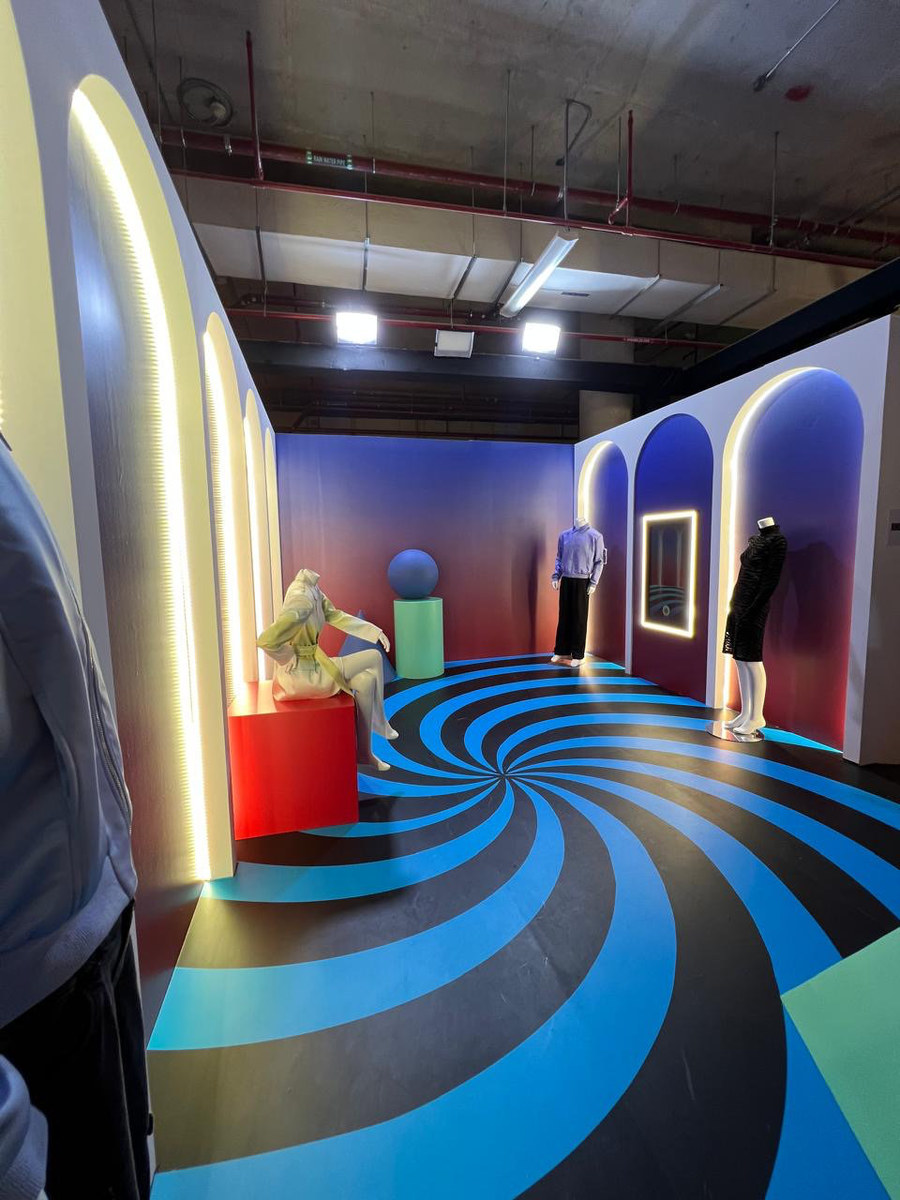
Riyadh Fashion Week collaborated with Snapchat to showcase the creations of five Saudi Arabian designers at the Tasawar exhibition, which uses augmented reality and AI to bridge the physical and digital realms. (AN photo by Rahaf Jambi)
However, he added: “Regarding the creative process, I think this is where designers might lose the core of their job. It’s for the designers to come up with ideas, pick fabrics and colors. That’s what makes them different from each other and that’s simply what creates an identity for the brand.
“I also believe that creativity is a human trait. Even if AI can be creative, it won’t be as authentic and influential as humans.”
Asked whether AI could allow top fashion designers to create a lasting “digital legacy” even after their passing, Yousif was skeptical. “I don’t think programming fashion is a smart idea, because fashion breaks itself when it becomes repetitive,” he said.
“Keeping an identity is important, but I imagine if Christian Dior had done this. I don’t think we would enjoy the work of John Galliano today. Same thing goes with Coco Chanel and Karl Lagerfeld. They both kept the founders’ style in a way that fits what’s new in fashion and at the same time allowed them to bring their own creativity.
“So why would any designer decide the future of their brand when you can never predict the future of fashion? Maybe your style won’t work later. Many of the brands we know today would’ve been forgotten if they hadn’t hired designers with a new style. Think of Gucci and Tom Ford.”
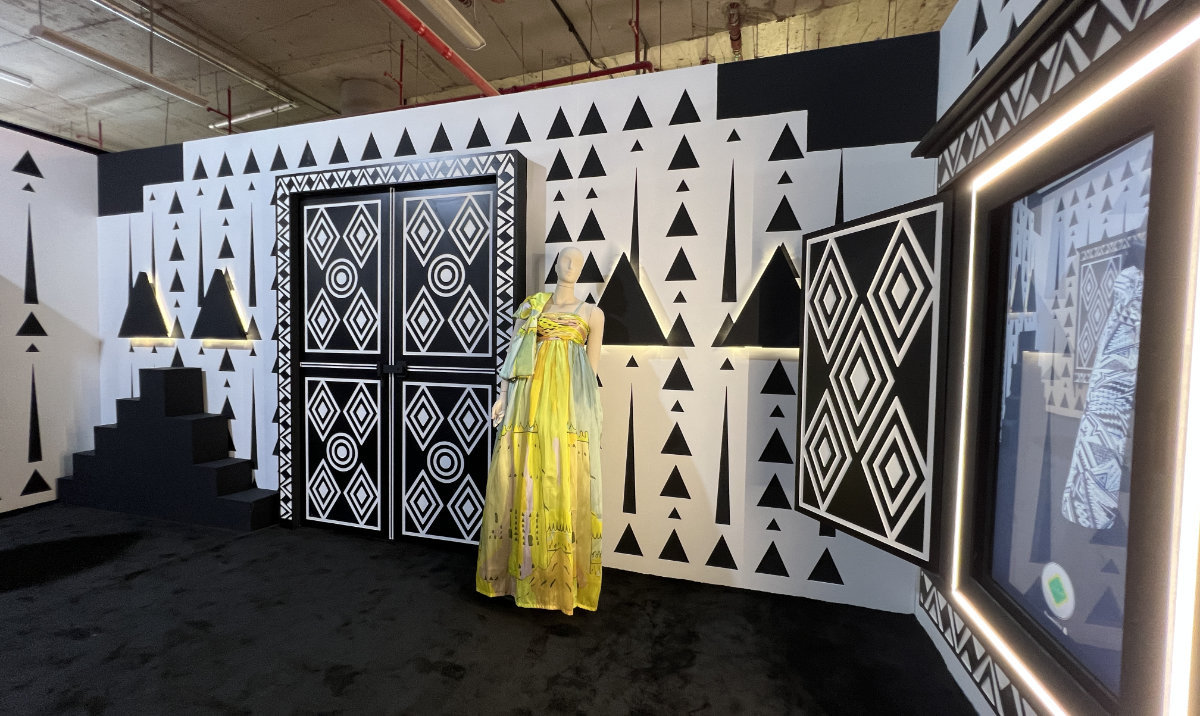
Riyadh Fashion Week collaborated with Snapchat to showcase the creations of five Saudi Arabian designers at the Tasawar exhibition, which uses augmented reality and AI to bridge the physical and digital realms. (AN photo by Rahaf Jambi)
This has not stopped emerging and established fashion designers from experimenting with the technology and incorporating it into aspects of their work.
At the WWD (Women’s Wear Daily) Global Fashion Summit held in Riyadh on June 6, US fashion designer Norma Kamali said that her brand will release a full collection this October that was created with the help of AI, experimenting with how it interprets past Kamali designs.
“It’s not like a copy of Norma Kamali: It’s something new, and I can tweak it, I can play with it,” she said. “But ultimately, I do plan to live to 120, so when I have to pass on the baton, my team will be trained to be able to use it, too.”
She added: “I’m teaching it to think the way I do, to behave the way I do, to kind of use what I think about when I’m creating a collection.”
However, Kamali also has her reservations. “AI is not a creative person, and that’s something that’s hard to replace,” she said. “AI can support a creative person, can extend a creative person’s possibilities, and the creative person can use AI as a tool.”
Many designers seem to agree that AI’s greatest strength when applied to the fashion industry is its role as a research assistant. Rakan Al-Shehri, brand and design lead at Adhlal, believes one major benefit of AI is the acceleration of the creative process
Opinion
This section contains relevant reference points, placed in (Opinion field)
“In the past, creatives often depended on platforms like Pinterest, Shutterstock, Pexels, and social media to create mood boards and visuals across different design disciplines,” he told Arab News. “With AI, you can now create highly precise visual references in the early stages of your creative process.
“For example, if I’m designing a brand identity for a fashion retailer that specializes in menswear, I want to transform the brand narrative into cohesive visual instruments for marketing campaigns, social media, websites, and more.
“With the story ready, I can simply go to Midjourney (AI generator) and write a prompt that generates numerous visual references. This allows me to gather inspiration and create a mood board in a matter of minutes instead of spending hours searching through vast visual libraries for inspiration.”
Al-Shehri said that another significant benefit “is cost efficiency.”
“As a freelance designer, external tools and stock imagery websites can be expensive and often exceed project budgets,” he said. “With AI, you have access to unlimited visual elements that are either free or fairly priced.”
One program Al-Shehri is particularly fond of is Midjourney — a generative AI that creates images from natural language descriptions similar to OpenAI’s DALL-E. “Midjourney is, in my opinion, the best AI visual-generating platform available,” he said.
“It has multiple functionalities that are easy to use. One of my favorites is the ‘/blend’ feature, which allows me to blend old visual styles with modern work to quickly generate new styles for exploration.
“I use Midjourney almost daily and highly recommend it to anyone in the creative industry.
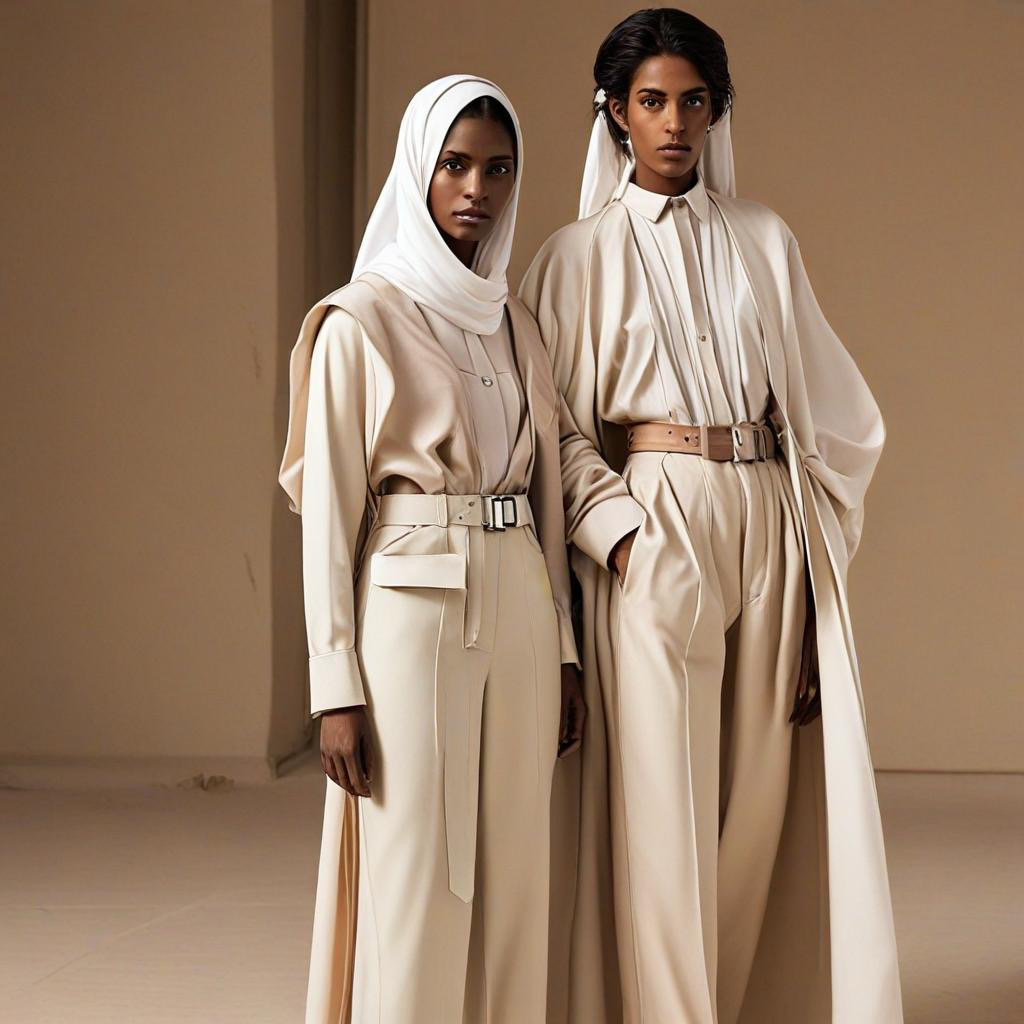
Photos created by AI. (Supplied)
Another generative AI that is proving popular among fashion designers is Krea.ai. “Krea builds amazing art-driven web-based tools that offer more control over the generated visuals, making it ideal for visual arts rather than commercial graphics,” said Al-Shehri. “I spend many hours experimenting with it.”
Luma Labs and its “Dream Machine,” which makes high quality, realistic videos from text and images, has also transformed the creative process.
“Luma Labs specialize in video and motion generation, and some of my favorite photographers and art directors use it extensively,” said Al-Shehri. “It’s an extremely beneficial tool for fashion photographers.”
For now, at least, fashion designers should not fear being replaced by an AI-Armani or Robo-Rabanne. Instead, says Al-Shehri, they can use these tools to streamline and accelerate their work.
“Overall, AI in its current state is an incredible tool that elevates the creative process for artists and designers,” he said.




